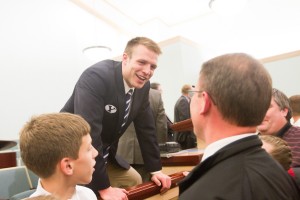Apparently nothing can stop fans of the Notre Dame Fighting Irish from having a good time.
It didn’t matter that the team was only 7-3 before its game with BYU, after a near-perfect season in 2012. It didn’t matter that it was one of the coldest home games in school history as temperatures threatened to drop out of the 20s and felt even more frigid due to wind chill.

Fans of the green and gold, rather, enthusiastically visited campus from around the country to hear and then follow the Fighting Irish band on a march to the stadium — not just on game day, but also on Friday: twice.
None of those obstacles stopped them from donning at least half a dozen layers of clothing to tailgate all morning, tirelessly giving directions to lost Cougar fans, consuming more than 6,000 gallons of hot chocolate or heading to the campus basilica for a post-game celebration of Mass.
It isn’t the thing BYU fans want to hear after a second stinging loss to Notre Dame in recent years, but there are things we can learn from the Fighting Irish faithful.
This is less of an indictment than a simple reality; Notre Dame won eight of its 11 national championships even before LaVell Edwards took the coaching reins at BYU, and it enjoys a history of football relevance that goes back much longer than what we’ve experienced in Provo.
Notre Dame isn’t quite as dominant of a football school as it once was; the university hasn’t won a national championship since 1988 after winning four in the 1940s and three more during the next two decades. But somewhere along the journey of their rich success, the fans of the Fighting Irish by and large accomplished something extraordinary: they transformed football into something greater than an athletic contest while precluding the contest itself from becoming bigger than just a game.
Both of these concepts are difficult — the first for communities and the second largely for individuals. Feeling the vitriol and self-loathing of fans after a loss can make it feel as though football has the power to divide us from others (read: University of Utah) more than it unites us among ourselves — that we boo louder than we cheer, so to speak.
But the football-as-community and football-with-perspective approaches are achievable and can enhance the fan experience at BYU for everyone: the team, students, alumni and visitors. It begins with investing more Loyal into the “Loyal, Strong and True” fight song mantra so familiar to us.
I’m talking about positivity, and I’m talking about viewing ourselves as contributors first and as critics a far second.
The football team would not exist without its fans, and clearly everybody with some sort of stake in the team is entitled to their own voice and opinions about issues affecting the team. But it’s equally intuitive that an hour spent playing the role of coach on an online comment board adds less to the total experience of Cougar football than, say, lining up to see the players on their stadium walk or sticking it out for the last five minutes of a lopsided game.
As superfluous as it may seem, enjoying some pre-game barbecue is still a greater social good than furiously Tweeting your existential disapproval of a player who, it is easy to forget, also has homework and career plans and dating to worry about. Greeting fans of opposing teams, who may be visiting LaVell Edwards Stadium for the first time, is certainly a worthy reason to extend your game-day schedule by a few minutes.
BYU students are typically busy people. Many alumni may wish they had more time and attention to spare for the BYU sports teams they once so eagerly followed. All things, least of all football, have their limits of moderation. There are church callings to be fulfilled, tests to be studied for and prior commitments to keep. And it’s obviously unfair to assume all BYU students are or should be fans of football.
But for those students who would like to see BYU grow into the football success Notre Dame has enjoyed, it would be wise to remember that fans are as responsible for the journey as the coaches and players are for the destination.




